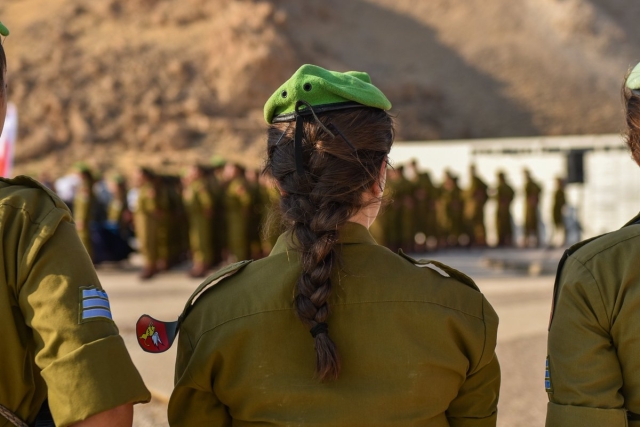Today, Shani Dadon lives in an upscale neighborhood of Tel Aviv. It was not always like this for her, Shani was born into and lived under the extremist, ultra-Orthodox sect 'Shuvu Banim' until the age of 14. The cult is famously known for the followers' resemblance to Muslim extremists in Afghanistan. The females, adhering to strict dress codes that prevent their faces or any skin from being shown, are called "Taliban Women" in the closed Mea Shearim neighborhood in Jerusalem.
According to Shani, the group’s leader, Rabbi Eliezer Berland, tried to rape and force himself on her. In addition, they tried to marry her to a man a decade older than her, an edict that she bravely refused. The reward for her bravery was to be "beaten" by her father, who threw her clothes out of the window and then stabbed her with a knife. "I felt that if I didn't pretend to be dead, it wouldn't end," she says. Late one night, she finally managed to escape and for six months she sustained herself by panhandling on the streets, relying on the famous charitable nature of Israelis. Her life took a positive turn when a social service unit within Israel's Police department took her from the street and placed her in a youth hostel.
Israeli court grants Breslov hasidic sect leader-fraudster-sex offender-alleged murderer Rabbi Eliezer Berland trip to Uman, Ukraine despite judicial “stay of exit” order, war, plea from Ukraine not to come
— Shmarya Rosenberg (@Shmarya) September 8, 2022
Hundreds of hasidim expected to join himhttps://t.co/WbzPXqF0fa
Shani dreamed of enlisting in the Israel Defense Forces and having a significant national service. "I saw myself fighting, with a weapon, defending my country. It was very important to me. I had such a voice inside that told me that I was doing the right thing for me and I am very proud of myself for that," she noted excitedly. Shani served as a fighter in the "Lions of Jordan" battalion, which is a mixed unit, made up of male and female soldiers.
Welcome the IDF’s newest co-ed infantry battalion, the “Lions of Jordan”. RT to wish them luck! pic.twitter.com/hB70eWwv7z
— Israel Defense Forces (@IDF) November 13, 2014
A few days before her enlistment, together with a friend who had also left the extremist Hasidic sect that has its roots in the Breslov community, following the teachings of Rabbi Nachman From Uman, Shani went to the Michael Levin Memorial Center to assist 'Lone-Soldiers' to meet with the coordinator of the program. "Since I came in, I feel part of a family. It's fun to be in it," she says, "I can open my heart to people I trust with my eyes closed." A Lone Soldier is someone who came from outside of Israel when they are 18-20 years old and enlisted in Israel's army. Typically, they have no family or direct ties to the Jewish State other than their sense of duty as Zionists who want to serve and protect their ancestral homeland. The Army tries to accommodate the soldier by pairing them with 'host families' and there are several NGOs that exist to help the Lone Soldier.
Over time I met a few former Lone Soldiers and the more I learned, the more admiration I developed for the sacrifices they made and dedication they had for defending Israel.
— The Country of Israel 🇮🇱 #AmYisraelChai ✡ (@JanetNewcomb) August 26, 2022
The association is named after Michael Levin, a young man who immigrated to Israel from Philadelphia and served in the Parachute Brigade. In the summer of 2006, the Second Lebanon War broke out. Michael, who was visiting his family in America at the time of the conflict, immediately returned to his unit. He was subsequently killed.
Today, on #YomHaZikaron—Israel's Memorial Day for Fallen Soldiers and Victims of Terror—I remember U.S.-born Staff Sergeant Michael Levin, twin brother of a close college friend, who was killed in action during the Second Lebanon War in 2006.
— Avi Mayer (@AviMayer) April 14, 2021
He was 22. pic.twitter.com/7zD6XQ5T9Y
The Center for Lone Soldiers in his memory was established following his vision to create a warm and supportive community for lone soldiers, a dream he shared with Tsiki Od, who was his 'adoptive father' in Israel. Together with Michael's friends, Od founded the "Michael Levin Memorial Center for Lone Soldiers" in 2009, which today supports thousands of lone soldiers.
Shani credits the IDF with everything from helping her learn Hebrew, to learning history and understanding the geo-political structure of the world. Many Ultra-Orthodox communities prefer Yiddish arguing Hebrew is the language of the Torah and therefore, holy and they do not read or care about global news and current events. The IDF has programs for enlistees that help enrich their education, teach them how to drive and for some, like Shani, teach her the basics as her community failed to do so.


